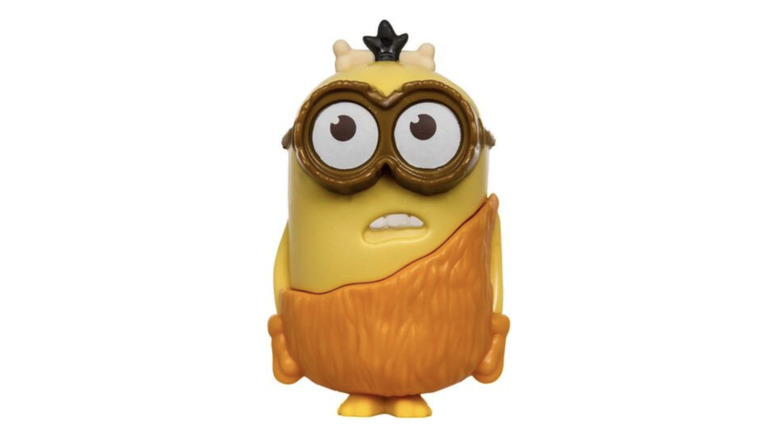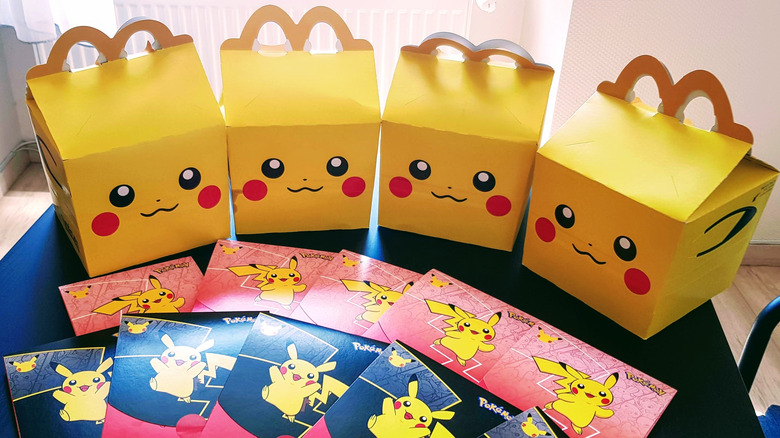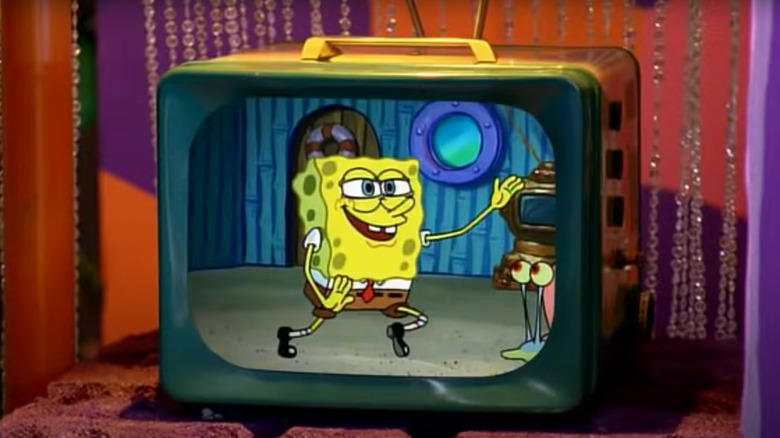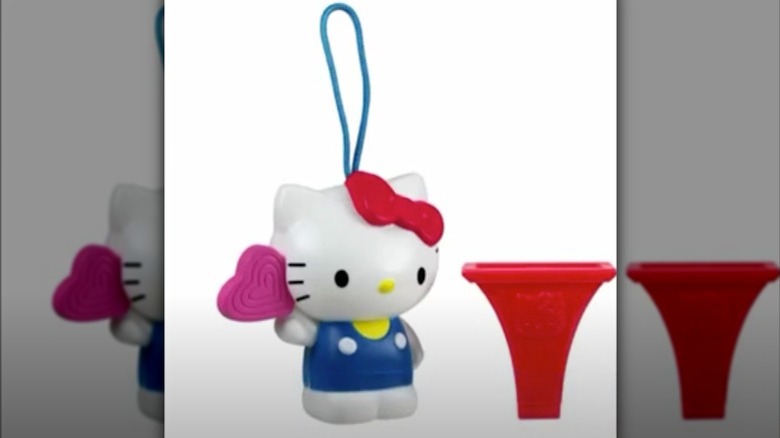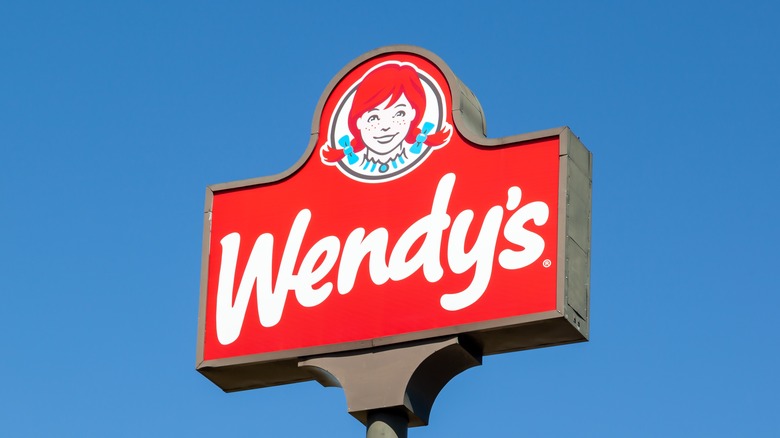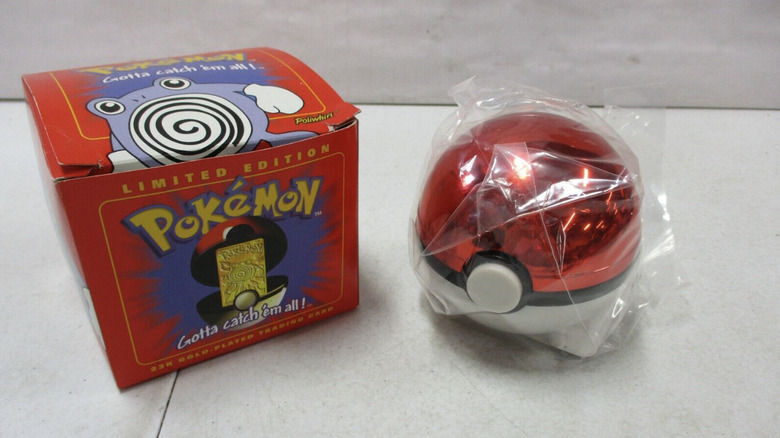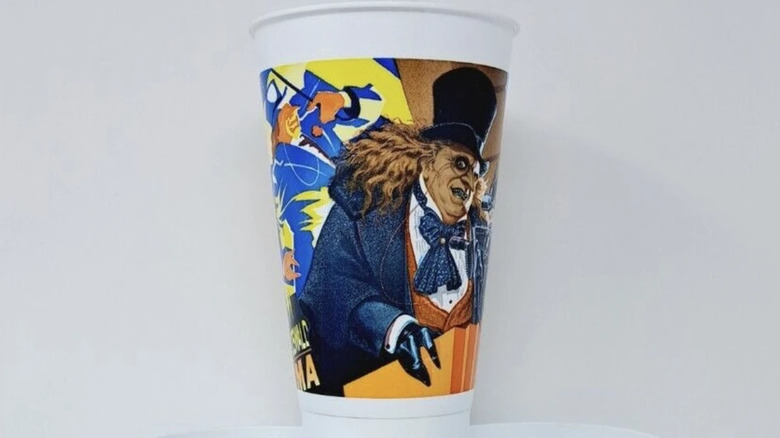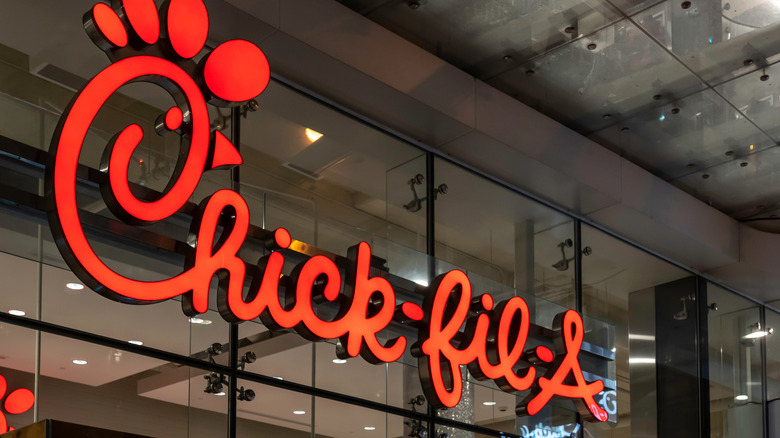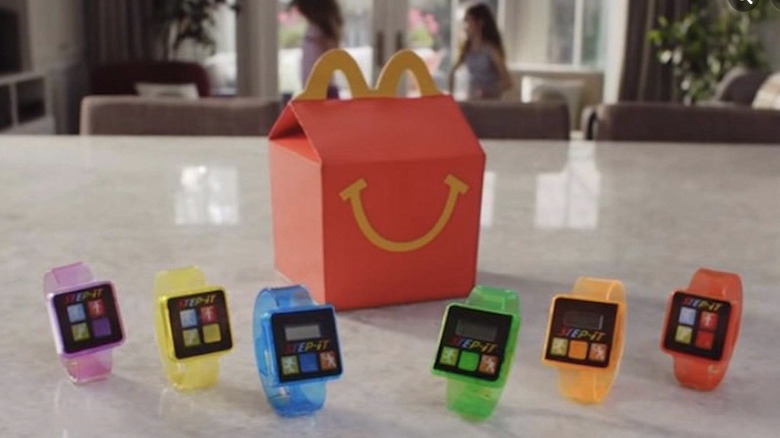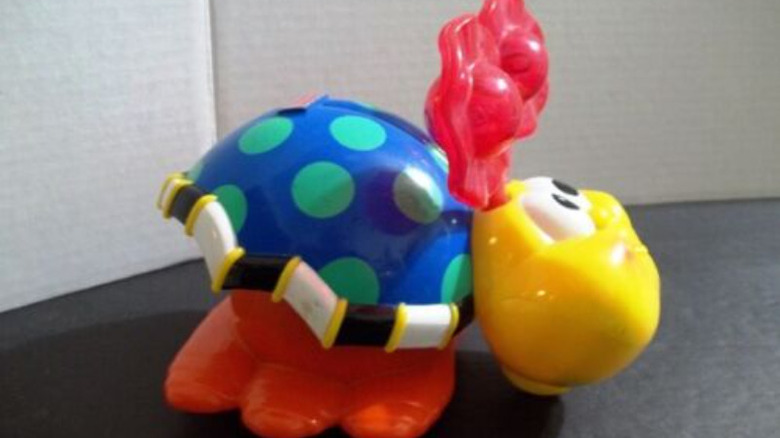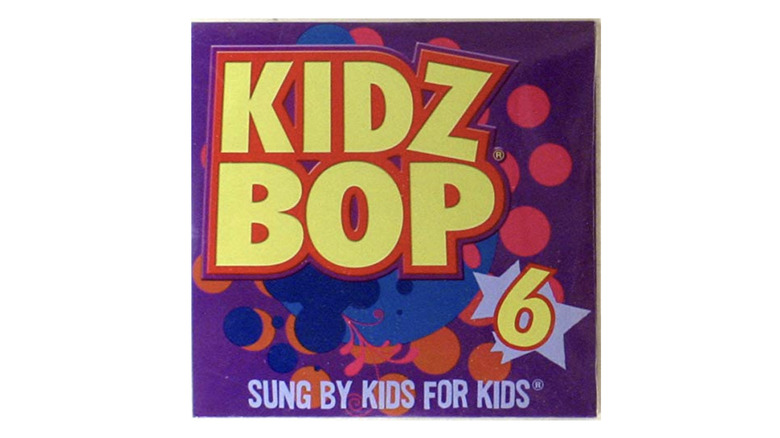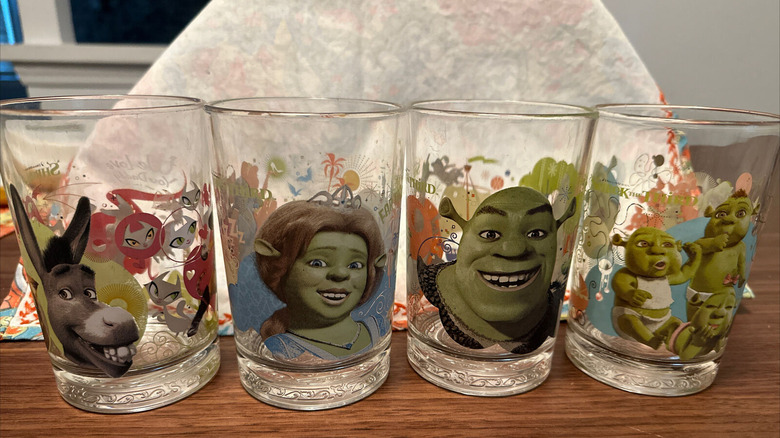The Most Controversial Fast Food Kids' Meals
We may receive a commission on purchases made from links.
Fast food kids' meals have come under fire in recent years for promoting unhealthy eating habits among children. This criticism has seen some fast food outlets make efforts to include more nutritious options for children, such as fruit and yogurt. Nevertheless, the overall quality of fast food advertising for children continues to be a concern, with many items packed with calories, salt, sugar, preservatives, and saturated and trans fats, as highlighted by MedicalNewsToday.
Today fast food kids' meals are largely associated with McDonald's Happy Meals although chains such as Burger King, Wendy's, and Chick-Fil-A have also been known to offer special kids' deals. The packaged meals usually come with a burger, french fries, a drink, and a small gift in the form of a toy. And while they are a convenient option for on-the-go families, kids' meals can be highly problematic. Not only do they usually contain unhealthy ingredients like high levels of sodium, but they commonly include plastic figurines that contribute to environmental problems and start consumerism at a young age.
Just when you thought things couldn't get any worse, some fast food marketing campaigns targeted at children have also been downright offensive or hazardous. Here are just a few of the more notable examples of where fast food joints got it all just wrong.
McDonald's Minions
In 2015, McDonald's caused a stir with its Minions Happy Meal when disgruntled parents started complaining that one of the figurines, the Minion Caveman, was using foul language. Based on the characters from the animated hit film of the same name, the toy came with three pre-recorded phrases that could be activated by knocking the toy against a solid surface.
While McDonald's executives claimed that the audio recordings were nothing more than "para la bukay," "hahaha," and "eh-eh," some moms and dads dared to differ, saying that they heard curse words.
The fast food giant denied the allegation that the Minion Caveman was using bad language, refusing to recall the toy. "We're aware of a very small number of customers who have been in touch regarding this toy, and we regret any confusion or offense to those who may have misinterpreted its sounds," a McDonald's spokesperson said in a statement at the time. As pointed out by MarketWatch, it's likely that the so-called salty language is an example of mondegreen — or a misinterpretation of a similar-sounding word.
McDonald's Pokémon
There was nothing technically wrong with McDonald's Pokémon promo. In fact, the Pokémon Happy Meal boxes stirred up controversy, not because of substandard or faulty add-ons, but due to their immense popularity — with adults. Released to celebrate Pokémon's 25th anniversary in 2021, each Pikachu-themed meal came with four trading cards out of a set of 54.
While the promotion was aimed at children, it was the adults who ruined all the fun by buying multiple Happy Meals at a time just to get their hands on the coveted cards. Despite shortages at some stores, some McDonald's outlets also let customers get Pokémon cards as "side items" to their meals. One card collector even Tweeted about getting 16 additional cards this way, "I just went to McDonald's and I ordered a happy meal and then I got 15 Pokemon card packs on the side, so I have 16 now."
Seeing a business opportunity, scalpers also got in on the action, selling the cards on eBay. One Pokémon card entrepreneur happily Tweeted about his financial success, "I bought 4 happy meals yesterday. I then sold 12 Pokémon cards for 30 dollars on eBay, within 5 minutes of listing them. Today around lunchtime, I will be returning to McDonald's to buy 10 happy meals to try and repeat my success."
Burger King's SpongeBob SquarePants
SpongeBob SquarePants is a popular animated character who lives in a fictional underwater world. In 2009, the yellow square-shaped sea sponge made waves when he became the face of a contentious advertising campaign involving Burger King's mascot The King. More specifically, the problem was the advertisement the franchise ran to promote its SpongeBob SquarePants kids' meal. The commercial, which featured the yellow character, saw The King dancing to a modified version of Sir-Mix-A-Lot's "Baby Got Back" with female backup dancers in tight outfits.
The SpongeBob SquarePants advertisement faced severe criticism for its objectification of women. It was also condemned for its suggestive content, which was deemed inappropriate for children. The Campaign for a Commercial-Free Childhood called the clip's sexual content inappropriate. The director of the organization, Susan Linn, explained in a statement made at the time, "It's bad enough when companies use a beloved media character like SpongeBob to promote junk food to children, but it's utterly reprehensible when the character simultaneously promotes objectified, sexualized images of women."
Both Burger King and Nickelodeon, which had given the green light to the promo, defended the commercial, stating that it was aimed at an adult audience. A spokesperson for the chain clarified that the ad was aired exclusively during time slots for mature audiences and was meant to capture the attention of adults who take their families to the chain's fast food outlets.
McDonald's Hello Kitty
The 2014 Hello Kitty Happy Meal campaign turned out to be an embarrassing and costly blunder for McDonald's, which had to recall over two million themed toys in the U.S. and Canada as a safety precaution. More specifically, it was the whistle that accompanied the Hello Kitty figurine that came as a part of the meal which posed a choking hazard.
The Consumer Product Safety Commission explained the decision to recall the toy, elaborating, "Components inside of the whistle can detach, posing choking and aspiration hazards to young children." The Commission alleged that it had received two reports of children inhaling a component of the whistle, which led to one child requiring medical treatment.
McDonald's was quick to respond to the fiasco, issuing a voluntary recall of the toys. The chain also offered replacement toys to customers who had purchased a Hello Kitty Happy Meal during the promotion. "We're happy to substitute this toy for another, and, in addition, we are offering the choice of either a yogurt tube or bag of apple slices," a spokesperson for the fast food giant said in a press release.
Wendy's Disco Fever CD
Many parents weren't impressed when Wendy's included the "Disco Fever" CD as a part of one of the chain's kids' meals. And while moms and dads had nothing against the music per se, it was a particular set of lyrics that caught their attention — and not in a good way. The contentious song on the CD was Donna Summer's "Last Dance."
While the original song features a set of lyrics that include the words "so bad," some parents weren't convinced, claiming to hear the words "so horny" instead. And since the CD had been promoted as appropriate for children above three, the lyrics caused substantial controversy. As a result of the backlash, Wendy's stopped offering the "Disco Fever" CD, which was one of a set of four offered by the chain. The other CDs included kid-friendly tunes such as "Celebration" by Kool & the Gang and "ABC" by Jackson 5.
Burger King's Pokémon balls
Burger King's Pokémon ball promo has been one of the most disastrous fast food marketing campaigns to date. In 1999, the chain launched an advertising campaign that offered customers a set of 57 different Pokémon toys inside specifically designed orb-shaped containers called Pokéballs. Measuring a little under three inches in diameter, the balls were made from two parts, which could be pulled apart to reveal a toy. The seemingly innocuous campaign turned deadly when two young kids suffocated on the balls. The parents of one of the children who tragically passed away won an undisclosed settlement after suing the fast food franchise.
In response, the Consumer Product Safety Commission and Burger King pulled 25 million Pokéballs, which were distributed by the chain over a two-month period. The recall received significant media coverage, even being featured on the "Today Show." Recall notices were also posted at over 8,000 Burger King outlets where they also appeared on tray liners and carry-out bags. Ann Brown, who was the chairwoman of the CPSC at the time, called the blunder the "worst case scenario," elaborating, "[This is] a major fast food chain, not just a toy store, distributing these toys by the millions." It also wouldn't be the last time that Burger King was sued.
McDonald's Batman Returns promotion
In 1992, McDonald's released a set of four glasses as a part of a Happy Meal deal to promote the film "Batman Returns." The glasses featured different characters and vehicles from the movie including Batman, Catwoman, and Penguin. However, it wasn't long before the Batman-inspired images on the cups started being criticized for being too dark and violent for children. Even the Dove Foundation got on board accusing McDonald's of breaking parents' trust by promoting a film "filled with gratuitous graphic violence?"
To say that McDonald's wasn't happy with Warner Brothers about how "Batman Returns" turned out is an understatement. According to Yahoo!, Tim Burton who directed the first two Batman films said that the fast food giant had a hand in him stepping away from the film franchise (Joel Schumacher directed "Batman Forever" and "Batman and Robin"). "I think I upset McDonald's. [They asked] 'What's that black stuff coming out of the Penguin's mouth. We can't sell Happy Meals with that!'," Burton elaborated.
While McDonald's didn't discontinue the "Batman Returns" promo, it did try to disassociate itself from the movie. In response to criticism of the Batman-themed Happy Meal cups, Rebecca Caruso, McDonald's director of media relations, stated, "The objective of the [Happy Meal] program was to allow young people to experience the fun of Batman the character. It was not designed to promote attendance at the movie."
Chick-fil-A's Muppets
The story of Chick-Fil-A's "The Muppets" promotion is a fascinating one. The 2012 marketing campaign saw the fast food chain offer five of the show's puppets that could be constructed from parts of a meal container. The deal went sour after Chick-Fil-A's president Dan Cathy said the chain supported the definition of family as supported by her understanding of the bible. And the Jim Henson Company wasn't impressed, issuing the following statement on Facebook: "The Jim Henson Company has celebrated and embraced diversity and inclusiveness for over fifty years, and we have notified Chick-Fil-A that we do not wish to partner with them on any future endeavors."
Just a day after the announcement, Chick-Fil-A declared that it was voluntarily recalling the toys. More specifically, a spokesperson for the fast food chain told Business Insider that the move had nothing to do with the statement made by The Jim Henson Company, adding, "Chick-Fil-A voluntarily withdrew the Jim Henson kids meal toys nationwide because of a potential safety concern." As for the safety issue, according to Chick-Fil-A, "there [had] been some reports of children getting their fingers stuck in the holes of the puppets."
McDonald's fitness trackers promotion
Fast food and fitness don't usually go hand in hand. However, in an attempt to promote a more active lifestyle among children, McDonald's once introduced a wearable device called the Step-It fitness tracker. Released in 2016, the watch-style wristband came as a part of the chain's happy meal. Unfortunately, the pedometer wasn't all it was cracked up to be, causing 70 cases of skin irritations and even burns.
One unimpressed parent took to Facebook to complain about the product, saying, "If your kids have this happy meal toy, do not let them play with it. Cason has a burn after playing with the toy for about 8 minutes." Her post gained traction and was shared 128,000 times, standing testament to the power of social media when it comes to spreading awareness about potential product safety hazards.
The fast food giant recalled the wristbands, offering compensation for customers who brought the device back to a store in the form of a toy, a yogurt tube, or those miraculous apple slices that don't turn brown. In total, McDonald's ended up having to recall 29 million activity trackers in the United States and 3.6 million trackers in Canada.
McDonald's Scooter Bug
No matter how appealing, a toy can be dangerous if it isn't properly designed and tested for safety. This is precisely what happened in the case of McDonald's Scooter Bug, which was released in 2000. Featuring a yellow face, a blue body with turquoise spots, and a red antenna, the colorful toy was designed with tiny legs that moved back and forth when it was rolled on the floor.
The deceptively cute three-inch toy, which came as part of the chain's Happy Meals for kids under three, featured an antenna that was prone to breaking off. The small part constituted a safety concern, with two reports of young children choking and one report of a child gagging on the piece, as highlighted by the Consumer Product Safety Commission. McDonald's ended up recalling 234,000 Scooter Bug toys, which were distributed by the fast food chain in both the U.S. and Canada from November 2000 until February 2001.
McDonald's Kidz Bop CD - Number 6
In 2009, McDonald's included a series of eight Kidz Bop CDs as a Happy Meal tie-in. However, it is the chain's "Kidz Bop CD — Number 6" in particular that some parents took issue with. The CD, which featured five popular songs covered by kids, was meant to both entertain and inspire children to sing along with the music. Instead, one of the songs raised eyebrows and ruffled feathers.
According to some moms and dads, an offensive word could be heard 52 seconds into the first song on the CD — a cover of "I Don't Wanna Be" by Gavin DeGraw. While the song's original chorus goes, "I'm tired of looking 'round rooms wondering what I've got to do or who I'm supposed to be," some parents said that this wasn't what they were hearing when listening to the song. "In the song, the word is supposed to be looking, but they're saying the f-word with the -ing on the end," said one disgruntled parent, as reported by 48WAFF.
Despite the outcry, McDonald's decided not to recall the CD, saying that the song doesn't contain any bad language. McDonald's spokeswoman, Danya Proud, said at the time, "We greatly value the high standards that families hold us to, and we would never include a lyric, word, or song that is inappropriate to children of any age."
McDonald's Shrek Forever After glasses
In 2010, McDonald's issued a statement urging parents to immediately stop using the "Shrek Forever After" glasses sold by the chain for $2 a pop. As it turns out, the 16-ounce glasses, which featured the characters of Shrek, Puss n' Boots, Fiona, and Donkey, contained cadmium, a toxin associated with a huge range of health problems from respiratory health to neurological damage (via OSHA). The presence of the substance on the movie-themed glasses was discovered by Jennifer Taggart from the Smart Mama Blog who alerted the Consumer Products Safety Commission.
Despite the fact that McDonald's was adamant that the glassware complied with all applicable regulatory requirements at the time of manufacture and distribution, the fast food giant pulled them off the market. At the time, the move was described as a mere precautionary measure. Nevertheless, according to Cracked, a federal investigation into the glassware found that even touching the glasses eight times per day — which isn't a lot considering children's fascination with new toys — could be dangerous for six-year-olds.

